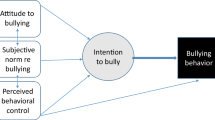Abstract
A contingency management program was established in a junior high school to better manage and educate students having histories of severe misconduct. School administrators selected 46 eighth-graders having multiple suspensions for misbehavior. Students (N=32) in two of the schools remained in traditional programs, serving as controls, whereas students (N=14) in the third school participated in a token reinforcement program. Reinforcers provided in the afternoon were contingent upon achievement and discipline during morning academic periods. Home-based reinforcers were established to support school behavior. Compared with the control group, significant reductions in negative school behavior as well as greater increases in academic achievement were obtained for the treatment group, thus supporting the efficacy of contingency management for adolescent school misbehavior.
Similar content being viewed by others
References
Axelrod, S.. Token reinforcement programs in special classes.Exceptional Children, 1971,37, 371–379.
Becker, W. C. (Ed.).An empirical basis for change in education: Selections on behavioral psychology for teachers. Chicago: Science Research Associates, 1971.
Broden, M., Hall, R. V., Dunlap, A., & Clark, R. Effects of teacher attention and a token reinforcement system in a junior high school special education class.Exceptional Children, 1970,36, 341–349.
Clark, M., Lachowicz, J., & Wolf, M. A pilot basic education program for school dropouts incorporating a token reinforcement system.Behavior Research and Therapy, 1968,6, 183–188.
Cohen, S. I., Keyworth, M., Kleiner, R. I., & Brown, W. I. Effective behavior change at the Anne Arundel Learning Center through minimum contact interventions. In R. Ulrich, T. Stachnik, & J. Mabry (Eds.),Control of human behavior (Vol. 3). Glenview, Illinois: Scott, Foresman, 1974.
Edwards, C. H. Modification of disruptive and nonacademic behaviors of junior high school students in the natural school setting: A token reinforcement program (doctoral dissertation, University of Utah, 1968).Dissertation Abstracts International, 1969,29 (8-A), 2560 (University Microfilms No. 69-3501).
Haring, N. G., & Hauck, M. A. Improved learning conditions in the establishment of reading skills with disabled readers.Exceptional Children, 1969,35, 341–352.
Hewett, F. M., Taylor, F. D., & Artuso, A. A. The Santa Monica Project: Evaluation of an engineered classroom design with emotionally disturbed children.Exceptional Children, 1969,35, 523–529.
Jastak, J. F., & Jastak, S. R.The Wide Range Achievement Test. Wilmington, Delaware: Guidance Associates of Delaware, 1965.
Krumboltz, J. D., & Thoresen, C. E. (Eds.).Behavioral counseling: Cases and techniques. New York: Holt, Rinehart & Winston, 1969.
Kuypers, D. S., Becker, W. C., & O'Leary, K. D. How to make a token system fail.Exceptional Children, 1968,35, 101–109.
Long, J. D., & Williams, R. L. The comparative effectiveness of group and individually contingent free time with inner-city junior high school students.Journal of Applied Behavior Analysis, 1973,6, 465–474.
Meichenbaum, D. H., Bowers, K. S., & Ross, R. R. Modification of classroom behavior of institutionalized female adolescent offenders.Behavior Research and Therapy, 1968,6, 343–353.
Miller, L. J. Effects of tokens and tokens with back-up reinforcers on the academic performance of juvenile delinquents (doctoral dissertation, University of Kansas, 1971).Dissertation Abstracts International, 1971,32, (4-A), 1947 (University Microfilms No. 71–27, 224).
Nolen, P. A., Kunzelmann, H. P., & Haring, N. G. Behavioral modification in a junior high learning disabilities classroom.Exceptional Children, 1967,34, 163–168.
O'Leary, K. D., & Becker, W. C. Behavior modification of an adjustment class: A token reinforcement program.Exceptional Children, 1967.33, 637–642.
O'Leary, K. D., Becker, W. C., Evans, M. B., & Saudargas, R. A. A token reinforcement program in a public school: A replication and systematic analysis.Journal of Applied Behavior Analysis, 1969,2, 3–13.
O'Leary, K. D., & Drabman, R. Token reinforcement programs in the classroom: A review.Psychological Bulletin, 1971,75, 379–398.
Patterson, G. R. An application of conditioning techniques to the control of a hyperactive child. In L. P. Ullmann & L. Krasner (Eds.),Case studies in behavior modification. New York: Holt, Rinehart & Winston, 1965.
Sidman, M.Tactics of scientific research. New York: Basic Books, 1960.
Tyler, V. O., Jr., & Brown, G. D. Token reinforcement of academic performance with institutionalized delinquent boys.Journal of Educational Psychology; 1968,59, 164–168.
Wolf, M. M., Giles, D. K., & Hall, R. V. Experiments with token reinforcement in a remedial classroom.Behavior Research and Therapy, 1968,6, 51–64.
Wolf, M. M., Hanley, E. L., King, L. A., Lachowicz, J., & Giles, D. K. The timer-game: A variable interval contingency for the management of out-of-seat behavior.Exceptional Children 1970,37, 113–117.
Zimmerman, E. H., & Zimmerman, J. The alteration of behavior in a special classroom situation.Journal of Experimental Analysis of Behavior, 1962,5, 59–60.
Author information
Authors and Affiliations
Additional information
Valuable assistance in developing the reinforcement program and curriculum materials was provided by William Brown, principal of the Anne Arundel County Learning Center. Thanks are also due: Dottie Dpwling and Joe Gentile, the teachers in the program; John Jedlicka, principal of Stemmers Run Junior High; and Donnie Williams, research assistant.
Rights and permissions
About this article
Cite this article
Heaton, R.C., Safer, D.J., Allen, R.P. et al. A motivational environment for behaviorally deviant junior high school students. J Abnorm Child Psychol 4, 263–275 (1976). https://doi.org/10.1007/BF00917763
Revised:
Issue Date:
DOI: https://doi.org/10.1007/BF00917763




